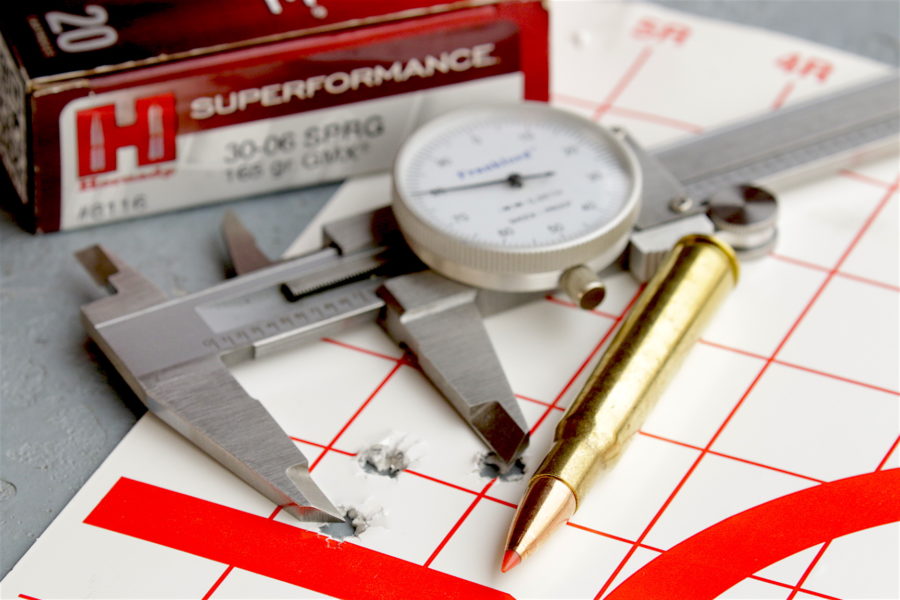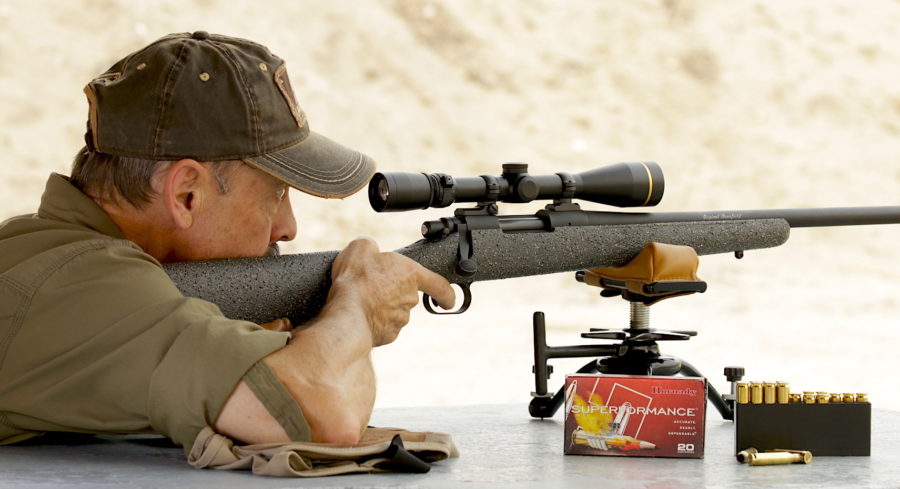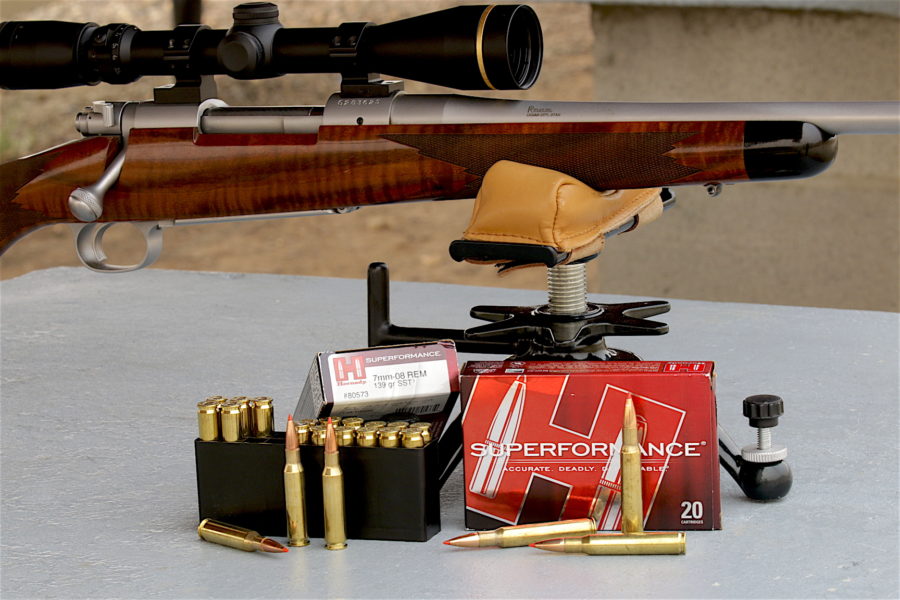Psst! Hey, buddy! Wanna buy a .300 magnum, cheap? Just shoot some Hornady Superformance ammunition in your .30-06 Springfield.
A typical .30-06 rifle should throw a 165-grain (just about the optimum weight for this round) about 2,850 fps from a 24-inch barrel. The Hornady Superformance loads I chronographed averaged 3,070 fps. That’s on par with a .300 H&H Magnum, a .300 Remington SAUM, and a .308 Norma Magnum, and it’s about 100 fps faster than a .300 Ruger Compact Magnum. New life for the old .30-06.
Superformance ammo isn’t exactly new, of course. It has been around since late 2010. There’s been plenty of time for it to prove itself. Now that the novelty has worn off, how’s it doing?
PAST PERFORMANCE
Superformance is performing afield pretty darn well, if my experience is any guide. I see it on gun store shelves everywhere. I’ve used it myself in .308 Winchester to take a couple of red stags—one shot each—a few feral hogs, and a black bear. For more empirical evidence, I decided to revisit it and run some quick range tests with a .30-06 M70 and a Kenny Jarrett 7mm-08 Remington, one of the best balanced, short-action deer, bear, hog, and elk cartridges available.

Caliper measures three-shot group punched by Hornady Superformance 165-grain GMX .30-06 load at .300 magnum speed.
.30-06 LOAD TESTED
The .30-06 load featured a 165-grain GMX, Hornady’s monolithic, copper-alloy, boat tail hollow point with a sharp, polymer tip. It averaged 3,070 fps, with three-shot groups clustering 1.08-inch to 1.06-inch from my pet M70 custom by Rifles, Inc. My first group about gave me a heart attack. It spread nearly four inches! Looked more like a buckshot pattern than a group. But the very next three shots settled down to 1.08-inch.
That initial group was not unusual for monolithic, copper, or copper-alloy bullets fired through barrels already dirtied by traditional jacketed lead-core bullets. I don’t know exactly why this happens, but be aware of it and don’t give up on GMX or other monolithic projectiles after just one or two groups. Either clean your barrel to bare metal or fire three to six copper bullets through your dirty barrel before shooting for group size with any monolithics.
After I’d put four shots down the .30-06 bore, my next three groups shrunk to just over MOA. That’ll deliver the goods for game well past the ranges at which I engage. Heck, MOA will keep things inside 10½ inches at 1,000 yards. And at more than 3,000 fps, I’ve turned my lowly .30-06 into a magnum.
7MM-08 LOAD PICKS UP SPEED
In the 7mm-08 Jarrett rifle I shot Superformance 139-grain SST bullets. Muzzle velocity averaged 3,012 fps. That’s still about 200 fps below 7mm Rem. Mag. speed, but only 100 fps slower than .280 Ackley velocity and right at .280 Remington speed. It’s a good 175 fps faster than typical 139-grain loads in the 7mm-08 Rem. Four three-shot groups clustered 1.2-inch to 1.7-inch with a 1½-inch average. This particular rifle is somewhat fussy about which bullets it likes. Some factory loads will spread as much as 2.35 inches, but others will huddle under MOA.
These 1½-inch average group sizes may seem horrible, but a 1½ MOA group means all bullets will fall inside of a 7½-inch circle at 500 yards. That’s farther than most of us will be targeting bear, deer, or even pronghorns. Seems a fair trade for gaining 175 fps more velocity.
What do you gain with this extra speed? Let’s compare typical 7mm-08 speed vs. Superformance speed, with both loads zeroed at 250 yards and a 10-mph right-angle wind.

As you can see, the trajectory and wind-deflection gains are minimal. It is the remaining energy differences that are most significant. In my estimation, even these are no big deal. Nevertheless, if you’re shooting factory ammunition and a Superformance load shoots a bullet you like with the accuracy you need, why turn down a ballistic advantage?
WHAT MAKES SUPERFORMANCE FASTER
Superformance gets its velocity edge via a special Superformance powder Hornady tailored to combust completely within standard barrel lengths for specific cartridges. The powder has a carefully controlled, progressive burn rate the brings peak pressure up more slowly than traditional powders and holds it near the peak longer. This accelerates bullets to higher velocities without increasing pressures.
Hornady’s Superformance ammo comes in a wide variety of cartridges, from .223 Rem. through several .300 magnums clear up to .375 H&H Magnum and even .444 Marlin. Bullets are mainly the GMX and SST, but a few loads use the InterBond and Interlock.

The author prepares to fire a Hornady Superformance 139-grain SST 7mm-08 Rem. downrange with a Jarrett rifle and Leupold VX-3 3.5-10x40mm scope.
Superformance Varmint comes with Hornady’s famous V-Max bullet in five cartridges, from .17 Hornet through .243 Winchester, and Superformance Match is offered in .223 Rem., 5.56mm NATO, and .308 Win. with several match bullets. As I see things, Superformance’s velocity advantage would be most valuable in Match ammo, depending on how the target game is being played. When fractions of an inch matter, the higher velocity and reduced wind deflection become game changers. Next in line comes the varmint ammo, since rodents offer tiny targets where an inch is as good as a miss. Last to realize an advantage are the big game loads, where an inch of two of trajectory difference might not matter so much as another 200 f-p of terminal energy.
If you’re looking for a simple, inexpensive way to “magnum up” your rifle performance, or if you just want a slight ballistic boost, Hornady Superformance ammunition might be the ticket.
For more from Ron Spomer, visit his website, ronspomeroutdoors.com, and be sure to subscribe to Sporting Classics for his features and rifle column.

